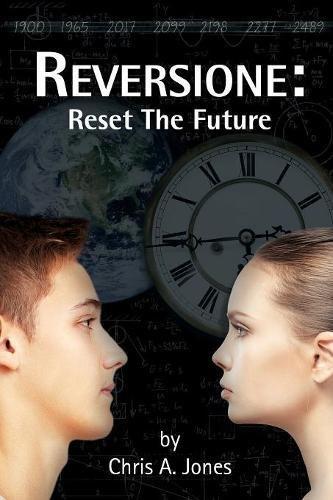You are here
Home ›I Love Time Travel, Even Though It’s Impossible
FTC Statement: Reviewers are frequently provided by the publisher/production company with a copy of the material being reviewed.The opinions published are solely those of the respective reviewers and may not reflect the opinions of CriticalBlast.com or its management.
As an Amazon Associate, we earn from qualifying purchases. (This is a legal requirement, as apparently some sites advertise for Amazon for free. Yes, that's sarcasm.)

by Chris A. Jones, author of Reversione: Reset The Future
Time travel has been a source of fascination for decades, serving as the central theme in some of our most treasured science fiction stories. But is time travel really possible? Although I’ve recently penned a novel centered on time travel, the truth is I personally don’t believe that it is possible. There are of various opinions, science, and theories circulating around this issue and there are a number of things that seem to negate the possibility of time travel, or at least prove to be quite problematic.
#1. The Grandfather Paradox. The Grandfather Paradox basically goes like this: if you go back in time and kill your grandfather, then you could never have been born. That means you could not have gone back in the first place as you never existed. We can see this demonstrated in the popular time travel movie Back To The Future, when Marty travels back in time to the day his parents met. Marty’s presence in the past ultimately messes with the day’s events so much that his mother ends up falling in love with him instead of his father. Obviously, Back To The Future is a work of fiction but you can see how complex the effects of time travel can be and why it is problematic.
#2. Alterations Of The Past Leading To Unexpected Consequences. Our view of history is based entirely on observations made by the people who lived that history, and those viewpoints are skewed by their own experiences and viewpoints. This creates a subjective narrative of history that is full of holes and misinformation. So if someone were to go back in time to purposefully alter history to try and make “improvements,” they could very well end up doing more harm than good. For example, if we traveled back in time to stop Adolf Hitler’s parents from ever meeting, we would surely save the world from an enormous amount of grief – but it’s impossible to know what other problems may be created through that alteration of the past.
#3. The Science Of Time Travel Isn’t As Easy As It Looks In Movies. If time travel could happen, it would require an enormous amount of power in order to open a doorway to the past. We would have to rip the fabric of space and time and cross from one side to another and then somehow close that rip. There are two major problems with this: first is the amount of energy required to rip the fabric of space and time. Second, if you could somehow generate that energy, how could you control where the rip allows you to cross over to? We simply don’t have the power to rip space and time, or to close that rip once we open it. Nor do we have any idea of how to properly control the rip if it’s created. Seeing as we are still trying to figure out how to venture out to the stars, venturing into the past or future seems unlikely to happen in the near or distant future.
I believe that the past, present, and future are all connected. What happens in the past effects both the present and the future. Our limited knowledge of the way current and past events impact the future makes it dangerous for us to meddle in the past. The complexities of cause and effect that occur through even a theoretical understanding of time travel are enough to turn a person’s brain to mush.
Though it’s hard to fathom time travel working in reality, there’s a reason why it has captured the hearts and minds of science fiction writers and fans for many generations. Using it as a device in a science fiction story creates possibilities that can turn an otherwise dull plotline into one of intrigue and fascination. I like to call it the fascination factor. It makes it possible for writers to capture the imagination and lead readers to think about how the story’s events take place and whether or not they all fit together in a logical way. It keeps the reader engaged from the start to the finish as they get to see how past, present, and future are all connected in a meaningful (and hopefully, logical) way.
Chris A. Jones grew up in Fayetteville, North Carolina and currently resides in Allen, Texas (near Dallas). He has a B.S. in Computer Science and has been working for over 15 years as a software engineer. Reversione: Reset The Future is his first published book, and the first in the Reversione series.
Reversione: Reset The Future is available on Amazon.com.
For more information, visit www.christopher-allen-jones.com and connect with the author on Facebook (book page), Facebook (author page), and Twitter.


